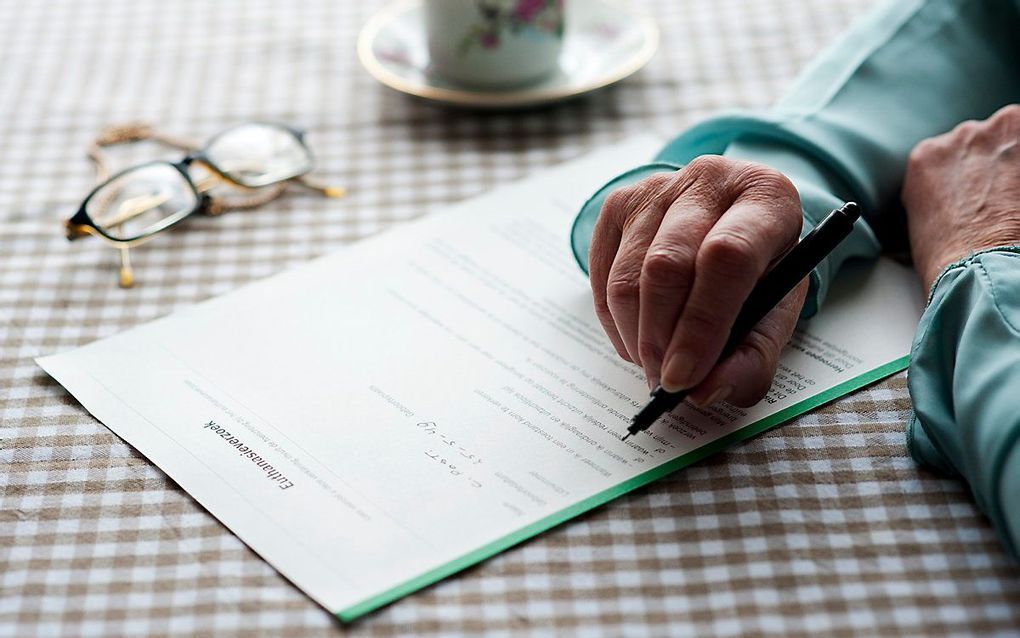Dutch Public Prosecution Service objects euthanasia code
22-07-2021
Western Europe
Coen Hermenet & Anne Vader, RD

An elderly woman writes a euthanasia request. photo ANP, Roos Koole
Western Europe
Due to the amended euthanasia code in the Netherlands, more patients would be eligible for euthanasia than allowed by Dutch law, the Public Prosecution Service says.
This wrote Dutch daily Trouw on Tuesday.
The Public Prosecution Service strongly disagrees with the euthanasia review committees on this. The conflict about the interpretation of the euthanasia rules arose after the Supreme Court ruled last year against the nursing home doctor Arends. She was prosecuted after she helped a patient with advanced dementia to get euthanasia. The patient was no longer able to request death herself. She did, however, wrote down the request earlier. The Supreme Court ruled that the doctor acted carefully.
After that ruling, the Regional Euthanasia Review Committees (RTE) amended their doctors’ guideline. The new euthanasia code states, among other things, that doctors may interpret a written request if it is not completely clear. It is primarily up to the doctor to decide whether the law has been complied with on essential points.
However, according to Public Prosecution Service chief Rinus Otte, this is not in accordance with the law. According to him, the review committees misinterpret the ruling. The doctors’ organisation KNMG shares the criticism of the Public Prosecution Service, a spokesperson confirmed in Trouw.

Otte argues that the different explanations can lead to a doctor following the guideline, acting carefully according to the review committees, but still being accused of murder by the Public Prosecution Service.
Sidelined
Director of Christian Dutch Patient Organisation (NPV), Diederik van Dijk, thinks it is a “positive message” that the Public Prosecution Service is dissatisfied with the amended euthanasia code. “Self-determination is the cornerstone of euthanasia practice. This is, however, about extremely vulnerable people who can no longer express their will and are killed anyway. That is irreversible.”
The Public Prosecution Service also points out that the euthanasia review committees rarely forward files to the Public Prosecution Service so that the judiciary can determine whether a doctor should be prosecuted. The forwarding of such a file only happens when such a committee finds that a doctor has acted negligently. “If this downward trend is related to an incorrect interpretation of the reviewing role of the RTE, this is cause for concern,” Otte writes.
According to Van Dijk, the Public Prosecution Service is effectively sidelined. “Whereas in something as fundamental as killing people, the control of criminal law should function fully.” He, therefore, calls the Public Prosecution Service’s wish to conduct an independent investigation into the judgments of the euthanasia committees “excellent.” “I hope that such a study will help to curb the ever-expanding euthanasia practice.”
Worrying
Kees van der Staaij, the leader of the Dutch Reformed Political Party (SGP), calls it “extremely worrying that euthanasia rules are being stretched further and further. This undermines the protection of lives of vulnerable people.”
“We have previously asked about the frameworks of review committees and attach great importance to the role of criminal law in this,” he said. In November last year, the SGP discussed the widening in the euthanasia code for people with dementia in the House of Representatives. “We are surprised that the review committees can now just widen the rules without further political consideration,” said SGP-MP Roelof Bisschop. His question as to whether the Public Prosecution Service was involved in the amendment of the code remained unanswered at the time.
ChristianUnion (CU) MP Mirjam Bikker calls it worrying that the euthanasia code does not comply with the law, according to the Public Prosecution Service and the KNMG. “This cannot remain without consequences.”

“We as a society are called upon to leave no doubt about the protection of life, especially among people who are incapacitated,” says the CU politician. “It should go without saying that the procedure is careful. There is no need for a directive that is in dispute, and the Public Prosecution Service must be able to test it.” The CU wants Health Minister De Jonge to provide clarity as soon as possible. “A clear guideline is also important to give doctors something to hold on to. They assist a patient in distressing circumstances. The guideline, therefore, must also be supported by the Public Prosecution Service,” says Bikker. According to her, an independent investigation can help “to ensure that due diligence standards continue to be leading.”
Increase of euthanasia cases
SGP, CU and the conservative-liberal party JA21 asked De Jonge in May whether he shared the concerns about the “significant increase” in the number of euthanasia cases in 2020. The minister said he finds the increase “not worrying” and sees no reason for further investigation. De Jonge said he did ask for the evaluation of the euthanasia law to give attention to developments in the number of cases, “particularly in the attitude of doctors towards (performing) euthanasia.” The results of that evaluation are expected in 2023.
This article was previously published in the Dutch daily Reformatorisch Dagblad, on July 20th, 2021.


